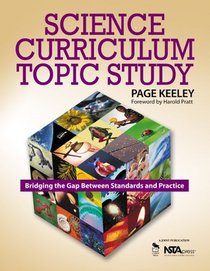Search -
Science Curriculum Topic Study : Bridging the Gap Between Standards and Practice
Science Curriculum Topic Study Bridging the Gap Between Standards and Practice
Author:
“It is by far the best thing I have seen on how to effectively use the standards.” — From the Foreword by Harold Pratt, Former President — National Science Teachers Association (2001-2002) — "Without question, this book will be of great value to the profession of science teaching. Given today’s educational landscape of s... more »
Cary Sneider, Vice President for Educator Programs
Museum of Science, Boston
Discover the "missing link" between science standards, teacher practice, and improved student achievement!
Becoming an accomplished science teacher not only requires a thorough understanding of science content, but also a familiarity with science standards and research on student learning. However, a comprehensive strategy for translating standards and research into instructional, practice has been lacking since the advent of standards-based education reform.
Science Curriculum Topic Study provides a systematic professional development strategy that links science standards and research to curriculum, instruction, and assessment. Developed by author Page Keeley of the Maine Mathematics and Science Alliance, the NSF-funded Curriculum Topic Study (CTS), process can help educators align curriculum, instruction, and assessment with the specific, research-based ideas and skills required in local, state, and national standards.
The CTS process will help teachers:
Author:
“It is by far the best thing I have seen on how to effectively use the standards.” — From the Foreword by Harold Pratt, Former President — National Science Teachers Association (2001-2002) — "Without question, this book will be of great value to the profession of science teaching. Given today’s educational landscape of s... more »
Cary Sneider, Vice President for Educator Programs
Museum of Science, Boston
Discover the "missing link" between science standards, teacher practice, and improved student achievement!
Becoming an accomplished science teacher not only requires a thorough understanding of science content, but also a familiarity with science standards and research on student learning. However, a comprehensive strategy for translating standards and research into instructional, practice has been lacking since the advent of standards-based education reform.
Science Curriculum Topic Study provides a systematic professional development strategy that links science standards and research to curriculum, instruction, and assessment. Developed by author Page Keeley of the Maine Mathematics and Science Alliance, the NSF-funded Curriculum Topic Study (CTS), process can help educators align curriculum, instruction, and assessment with the specific, research-based ideas and skills required in local, state, and national standards.
The CTS process will help teachers:
- Improve their understanding of science content
- Clarify a hierarchy of content and skills in a learning goal from state or local standards
- Define formative and summative assessment goals and strategies
- Learn to recognize and address learning difficulties
- Increase opportunities for students of all backgrounds to achieve science literacy
- Design or utilize instructional materials effectively
ISBN-13: 9781412908924
ISBN-10: 1412908922
Publication Date: 2/23/2005
Pages: 312
Rating: ?
ISBN-10: 1412908922
Publication Date: 2/23/2005
Pages: 312
Rating: ?
0 stars, based on 0 rating
Publisher: Corwin Press
Book Type: Paperback
Other Versions: Hardcover
Members Wishing: 0
Reviews: Amazon | Write a Review
Book Type: Paperback
Other Versions: Hardcover
Members Wishing: 0
Reviews: Amazon | Write a Review
Genres:
- Nonfiction >> Education >> General




